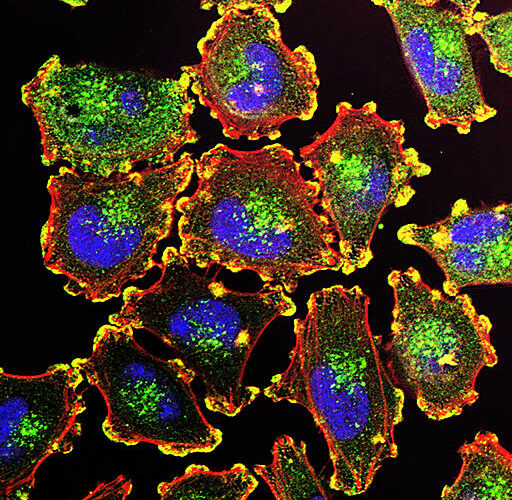T-VEC Virus Found to be Effective Treatment for Malignant Melanoma

Scientists were able to cure patients of skin cancer with a genetically modified virus, making it the first successful virus-based treatment in a phase three trial. Malignant melanoma is the most dangerous form of skin cancer and the fifth most common cancer diagnosed in the UK 1. Currently, most treatments include invasive chemotherapy, radiotherapy and surgery, all of which are accompanied by an increased risk of additional harm. In a phase three trial, researchers found that the new therapy, Talimogene Laherparepvec (T-VEC) targets cancer cells specifically and has fewer side effects compared to traditional cancer treatments.
T-VEC is a genetically modified version of the herpes simplex virus type 1. It multiplies inside cancer cells until they burst open and produces GM-CSF molecules, which stimulate the immune system to destroy the tumour 2. The virus was also modified to prevent it from causing damage to healthy tissue or from infecting healthy cells.
The clinical trials were led by researchers from the Institute of Cancer Research (ICR) in the UK and took place across the UK, US, Canada and South Africa. 436 patients with advanced, inoperable malignant melanoma were randomized to receive either T-VEC or the current best immunotherapy drugs. 16.3% of the patients who were treated with T-VEC responded strongly compared to 2.1% of the patients who were treated with the control immunotherapy 3. Some patients treated with T-VEC showed a response that lasted longer than three years, which is a standard benchmark used by oncologists to define a cure. T-VEC has proven that survival for melanoma patients can be lengthened by years. However, this may only apply for some patients.
“Previous studies have shown T-VEC could benefit some people with advanced skin cancer, but this is the first study to prove an increase in survival,” said Dr. Hayley Frend, science information manager at Cancer Research UK. “The next step will be to understand why only some patients respond to T-VEC, in order to help better identify which patients might benefit from it.”
T-VEC hasn’t been licensed yet, but researchers believe that it would be a great addition to current melanoma treatments that are already available on the market. It has also raised hopes for an end to chemotherapy 4. In the meanwhile, researchers are applying the same process to develop treatments for other cancers. Professor Paul Workman, Chief Executive of ICR, London said, “We may normally think of viruses as the enemies of mankind, but it’s their very ability to specifically infect and kill human cells that can make them such promising cancer treatments.”
Edited by Debbie Nicol
References
- Knapton, S. (2015, May 27). “Genetically engineered virus ‘cures’ patients of skin cancer.” The Telegraph. Retrieved from http: http://www.telegraph.co.uk/news/science/science-news/11631626/v.html
- Devlin H. (2015, May 27). “Virotherapy: skin cancer successfully treated with herpes-based drug.” The Guardian. Retrieved from http://www.theguardian.com/science/2015/may/26/skin-cancer-patients-successfully-treated-with-herpes-based-drug
- Whiteman, H. (2015, May 27). “Groundbreaking treatment uses herpes to combat skin cancer.” Medical News Today. Retrieved from http://www.medicalnewstoday.com/articles/294397.php
- Roberts, M. (2015, May 26). “Cold sore virus ‘treats’ skin cancer.” BBC News. Retrieved from http://www.bbc.com/news/health-32881552











Oncolytic virotherapy has been approved already 2005 in China for head- and neckcancer and therefore this is not the first successful virus-based treatment.
This is the first successful virus-based treatment for malignant melanoma.